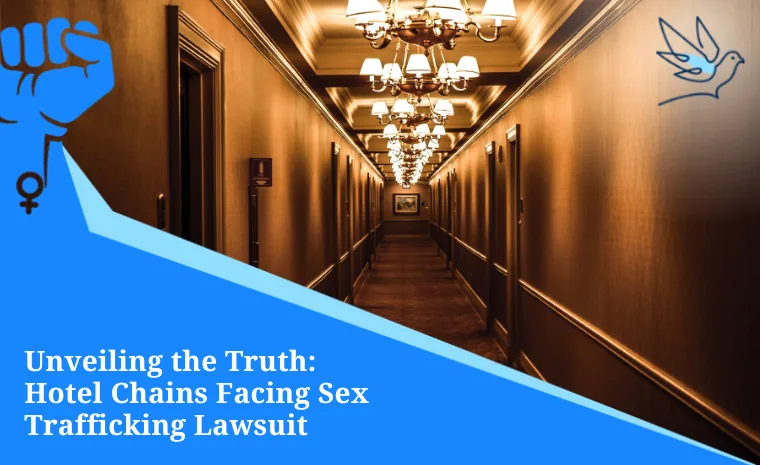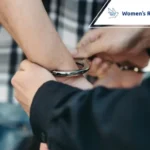In recent years, the global fight against human trafficking has intensified, shedding light on the dark and often hidden corners of our society. While progress has been made in raising awareness and implementing measures to combat this heinous crime in California, a troubling reality persists – the involvement of some hotel chains in the perpetuation of sex trafficking. As advocates for women’s rights, it is imperative to confront this uncomfortable truth, and some of the current sex trafficking lawsuits unfolding against prominent hospitality establishments serve as a reminder that justice can be done.
The stark intersection between the hospitality industry and sex trafficking has become a pressing concern, necessitating a critical examination of the role played by major hotel chains. In fact, according to the National Human Trafficking Hotline, hotels and motels are the third most common venue for sex trafficking, behind pornography and illicit massage parlors, making these establishments a battleground in the fight against this pervasive crime.
Today’s blog will analyze the legal challenges faced by hotel chains implicated in sex trafficking cases, offering a comprehensive analysis of the unfolding lawsuits that echo the collective call for change.
In doing so, we aim to contribute to the ongoing dialogue surrounding women’s rights, urging for a systemic shift that prioritizes the safety and well-being of those most vulnerable in our society.
The Prevalence of Sex Trafficking in the Hospitality Sector
The prevalence of sex trafficking in the hotel industry is a distressing reality that demands attention and collaborative action. Various statistics and trends emphasize the gravity of the situation, shedding light on the intersection between human trafficking and major hotel chains.
- High Incidence of Trafficking Cases in Hotels: Recent studies reveal that hotels and motels serve as common venues for sex trafficking activities. According to the Polaris Project, an organization dedicated to combating human trafficking, more than 1,500 cases of sex trafficking were reported in hotels and motels in the United States alone in a single year. This alarming figure indicates the significant role that these establishments play in facilitating such illicit activities.
- Vulnerability of Hotel Staff: Sex trafficking victims are often subjected to exploitation within the very establishments that should provide a safe environment. Hotel staff, including housekeeping and front desk personnel, can unwittingly become witnesses or, in some cases, unknowing participants in these criminal activities. Recognizing and addressing the vulnerability of hotel employees is crucial for developing effective strategies to combat sex trafficking within the industry.
- Corporate Responsibility and Accountability: Implicated hotel chains are increasingly facing legal scrutiny and public backlash for their perceived complicity in sex trafficking. Advocacy groups and survivors’ advocates argue that these corporate entities have a responsibility to implement robust policies and training programs to detect and prevent sex trafficking within their premises. Furthermore, there is a growing expectation for hotels to collaborate with law enforcement agencies and non-profit organizations to actively combat human trafficking.
- Legislation and Legal Action: Governments are responding to the urgency of the issue by enacting legislation that holds hotel chains accountable for preventing sex trafficking on their premises. Some jurisdictions now impose fines on hotels that fail to implement adequate anti-trafficking measures, recognizing the pivotal role these establishments play in either perpetuating or combating human trafficking.
- Industry Collaboration and Best Practices: In response to mounting pressure and awareness, some hotel chains are proactively engaging in industry-wide collaborations to share best practices for preventing sex trafficking. These initiatives often involve training programs for staff, implementing technologies to identify potential trafficking situations, and fostering partnerships with NGOs specializing in human trafficking prevention.
The convergence of these statistics and trends emphasizes the urgency of addressing sex trafficking within the hospitality industry. The corporate responsibility of implicated hotel chains extends beyond legal compliance, requiring a commitment to proactive measures that contribute to eradicating this heinous crime from their premises and, by extension, the broader community.

Sex Trafficking Lawsuits Against Hotels in the U.S.
Human trafficking lawsuits have become more common in the last ten years, with victims seeking compensation and help after enduring sexual exploitation, physical abuse, and emotional distress in individual hotels across the country.
Major hotel companies are facing civil and criminal prosecution for their roles in this heinous crime, with more and more legal options becoming available for the victims of sex trafficking. For those reasons, we feel it is important to review what arguments are being used in the lawsuits against hotel corporations, the fight faced by human trafficking lawyers around the country, and why hope is never lost in such cases.
S.C. v. Wyndham Hotels & Resorts, Inc.
In this sex trafficking case, the victim, “S.C.” filed a lawsuit against eight hotel corporations, including Wyndham Hotels and Resorts, Inc. As a sex trafficking victim, she argues that these businesses financially benefited from the human trafficking happening in their premises, violating the Trafficking Victims Protection Reauthorization Act (TVPRA). The main focus is on the alleged roles of Wyndham and Days Inn in the plaintiff’s trafficking at Lakewood Days Inn by Wyndham.
Furthermore, a woman reported that she had been trafficked from hotels owned by Wyndham Hotels, including a Super 8 in Hampton, Virginia, in 2012. She found herself in this situation after seeking refuge with a man when facing homelessness. The lawsuit was filed on December 2nd. 2019, and claimed that the woman was compelled to engage in sexual acts with men. Shockingly, the trafficker allegedly bribed hotel staff to turn a blind eye to the illicit activities happening around them. The lawsuit highlighted that many of the men involved were repeat customers, entering through the front lobby.
The 32-year-old woman, sharing her harrowing experience with The Associated Press, expressed a sense of invisibility throughout the ordeal. “That was the worst part, knowing that people knew and nobody was willing to help,” she disclosed. The abuse endured for 43 days until the woman managed to escape when her trafficker, exhausted from beating her, fell asleep. Despite the traumatic past, the Richmond woman has since rebuilt her life, being now married and employed as a restaurant general manager.
Does v. Red Roof Inns Inc.
Red Roof Inn has reached a settlement over allegations of its involvement in and profit from years of sex trafficking at two Atlanta-area hotels just before the commencement of a federal court trial scheduled for Monday.
The settlement follows a civil case initiated by four women who claimed to be victims of sex trafficking at Red Roof Inn hotels located on Corporate Plaza in Smyrna and North Druid Hills Road in Buckhead between 2010 and 2017.
Red Roof Inn, headquartered in Ohio and Texas, was part of a comprehensive sex trafficking lawsuit filed in Georgia in 2019 by the four Jane Doe plaintiffs, who remained anonymous. In this particular case against Red Roof Inn companies, the victims sought damages of up to $150 million each. Red Roof Inn emphasized its condemnation of sex trafficking and mentioned its mandatory human trafficking training for employees and franchisees to detect and report trafficking activities. The hotel chain also stated its collaboration with industry organizations to prevent such criminal activities.
The victims recounted being subjected to torture, beatings, drugging, and rape at the Red Roof Inn hotels, which they asserted were widely recognized as venues for sex trafficking. They claimed that hotel employees warned traffickers of law enforcement activities and engaged in sexual transactions with the victims. The settlement was reached to avoid further litigation, according to Red Roof Inn. The details of the settlement and questions about it remain undisclosed as of this publication.
B.J. v. G6 Hosp.
A federal judge has ruled that G6 Hospitality, the management company for the Studio 6 and Motel 6 hotel chains, must face claims of involvement in sex trafficking at a hotel location in California. The victim, identified as B.J., alleges that she endured sex trafficking at five California hotels between 2012 and 2016, including Studio 6 and Motel 6. She claims that the abuse was open and obvious, and staff knew about it but failed to intervene.
B.J. asserts that there was a “daily parade” of buyers and unregistered guests who were allowed to enter the hotels and abuse her. The complaint alleges that for decades, the defendants, including G6 Hospitality, Hilton Hotels, Choice Hotels, and Marriott, have allowed criminal traffickers to engage in sex trafficking on their properties, prioritizing profits over human life and dignity.
The victim sought damages under the William Wilberforce Trafficking Victims Protection Reauthorization Act of 2008 (TVPRA), which holds defendants civilly liable for knowingly benefiting from participation in a venture involved in human trafficking. B.J. alleges that the hotel chains knowingly benefited from her trafficking at their locations.
The court found that the manager’s actions were not so disconnected from his authority as the hotel manager to be deemed outside the scope of employment. B.J. alleges that the manager actively participated in her trafficking by working directly with her trafficker, arranging discounted rooms for the trafficker, and alerting them when the police were nearby. The plaintiff also claims that the hotel staff, required to report indications of human trafficking, should have known about the abuse, given the visible signs such as bruising, cigarette burns, and malnourishment.
This ruling allows B.J. to pursue her claims against G6 Hospitality for its alleged complicity in sex trafficking at the Studio 6 location in Concord, California.
A Fight for Safety and Human Rights
The unfolding sex trafficking lawsuits against major hotel chains highlight a disturbing intersection between the hospitality industry and human trafficking. As advocates for women’s rights emphasize the urgency of addressing this pervasive issue, statistics reveal a distressing prevalence of sex trafficking within hotels, with victims often exploited on the premises. The legal landscape reflects a growing demand for corporate responsibility and accountability, leading to legislation that holds implicated hotel chains liable for preventing sex trafficking.
While some chains face legal consequences and public scrutiny, industry collaborations and best practices are emerging to combat the problem. The specific cases against hotel chains reveal harrowing details of sex trafficking victims seeking justice. As these legal battles unfold, it becomes evident that addressing sex trafficking within the hospitality industry requires a multifaceted approach.
Beyond seeking legal help, a cultural shift emphasizing the safety and well-being of vulnerable individuals is essential. The convergence of legal actions, industry initiatives, and advocacy efforts emphasizes the collective commitment to eradicating sex trafficking from hotels and creating a safer environment for all.






